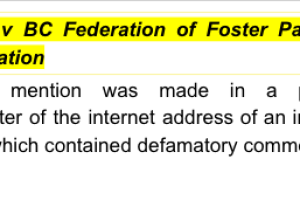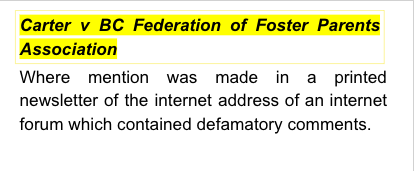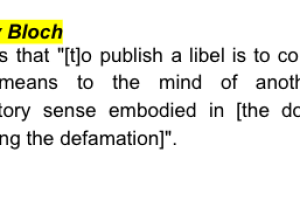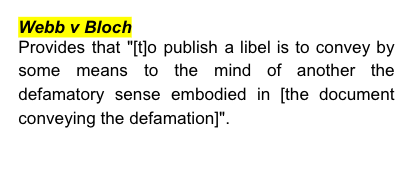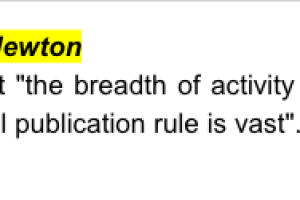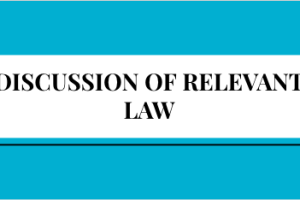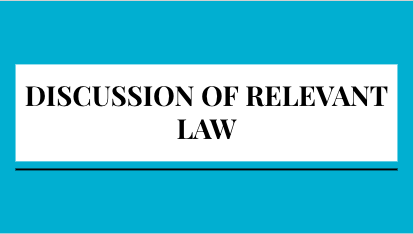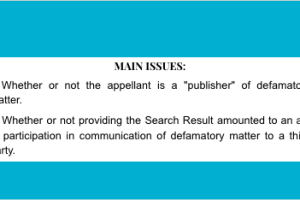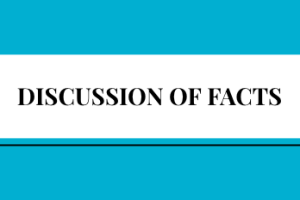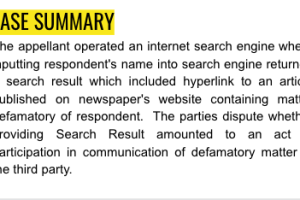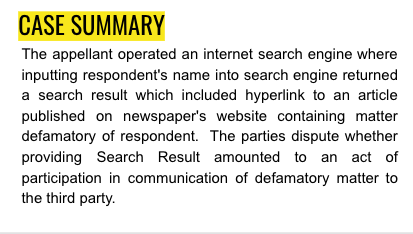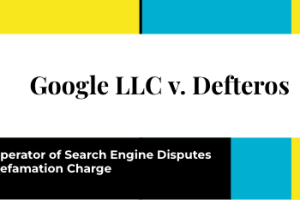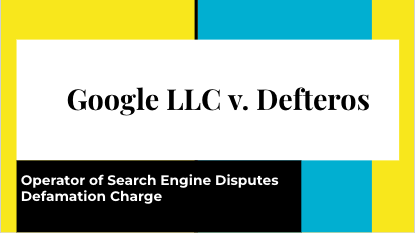Operator of Search Engine Disputes Defamation Charge

Google LLC v Defteros [2022] HCA 27 (17 August 2022)

The appellant operated an internet search engine where if one inputs the respondent's name into the search engine would result in a hyperlink to an article published on the newspaper's website containing a matter defamatory to the respondent. The parties disputed whether providing Search Result amounted to an act of participation in communication of defamatory matter to the third party.

Facts:
The respondent, George Defteros, is a solicitor who has practised criminal law for many years. He has acted for persons who became well-known during Melbourne's "gangland wars", including Dominic ("Mick") Gatto and Mario Condello. In 2004, the respondent and Mr Condello were charged with conspiracy to murder and incitement to murder Carl Williams and others and were committed to stand trial. In 2005, the Director of Public Prosecutions withdrew the charges against the respondent.
In the intervening period, the prosecution of the respondent and Mr Condello was widely reported, including in The Age newspaper, and articles were placed on that newspaper's website. The appellant, Google LLC, makes available to those seeking to navigate information on the World Wide Web its search engine. In early 2016, the respondent became aware that an internet search of his name using the Google search engine produced search results which included a snippet of an article published by The Age in 2004, on the day after the respondent was charged. This was termed the "Search Result" in the proceedings below.
The title of the article, displayed in the Search Result, contained a hyperlink to the full article on The Age's website. The article was entitled "Underworld loses valued friend at court". In the proceedings below it was referred to as the "Underworld article". Together, the Search Result and the Underworld article were said to comprise the "Web Matter" which the respondent claimed defamed him.
The respondent claimed damages for defamation from the appellant as the publisher of the Web Matter. The appellant relevantly pleaded, in the alternative, both the common law and statutory defences of innocent dissemination and qualified privilege. Her Honour found that the Web Matter conveyed the defamatory imputation that the respondent had crossed the line from being a professional lawyer, to become a confidant and friend of, criminal elements. Only the defence of statutory qualified privilege was made out and only with respect to a substantial proportion, but not all, of the persons to whom her Honour found the Web Matter had been published.
Her Honour awarded the respondent general damages of $40,000 and later made further orders for interest and costs, the latter reflecting the "mixed success" of the parties in the proceedings. That second action was dismissed. The appellant sought leave from the Court of Appeal to appeal the judgment in respect of the Web Matter, and the respondent sought leave to cross-appeal in relation to the costs order for the same.
The parties also filed applications and cross-applications for leave to appeal in respect of the second action. The Court of Appeal (Beach, Kaye and Niall JJA) granted both applications for leave to appeal but dismissed the appeals.It also dismissed both cross-applications for leave to appeal in relation to costs.

Issues:
I. Whether or not the appellant is a "publisher" of defamatory matter.
II. Whether or not providing the Search Result amounted to an act of participation in communication of defamatory matter to a third party.

Applicable law:
Crookes v Newton [2011] 3 SCR 269 at 281-282 [18]- provides that "the breadth of activity captured by the traditional publication rule is vast".

Webb v Bloch [1928] HCA 50; (1928) 41 CLR 331 at 363 - provides that "[t]o publish a libel is to convey by some means to the mind of another the defamatory sense embodied in [the document conveying the defamation]".

Carter v BC Federation of Foster Parents Association (2005) 257 DLR (4th) 133 - where mention was made in a printed newsletter of the internet address of an internet forum which contained defamatory comments.

Carter v BC Federation of Foster Parents Association (2005) 257 DLR (4th) 133 at 140 [12] - held that a reference to an article which does not repeat the defamatory comment itself is not a republication of it.
Hong Kong in Oriental Press Group Ltd v Fevaworks Solutions Ltd [2013] HKCFA 47; (2013) 16 HKCFAR 366 at 377 [19] - provides that "A person was held liable for publishing a libel if by an act of any description, he [or she] could be said to have intentionally assisted in the process of conveying the words bearing the defamatory meaning to a third party, regardless of whether he [or she] knew that the article in question contained those words."
Analysis:
The provision of the Search Result, including the hyperlink, has no connection to the creation of the Underworld article; its creation was in no way approved or encouraged by the appellant, and the appellant did not participate in it being placed on The Age's website.
Hyperlinks have the same relationship to the content to which they link as do references, her Honour observed. Both communicate that something exists but do not by themselves communicate its content. Both require an act on the part of a third party before access is gained to the content.
The fact that accessing the content is made far easier with hyperlinks does not alter the fact that a hyperlink, by itself (and as distinct from a search result in which the link is embedded), is "content‑neutral". A hyperlink will constitute publication if, read contextually, the text that includes the hyperlink constitutes adoption or endorsement of the specific content to which it links.
A mere reference without endorsement or adoption remains content‑neutral; but where the specific content is endorsed or adopted the reference can be understood to actually incorporate the defamatory content. The rules of publication apply where a person endorses, adopts or otherwise approves of defamatory matter which is to be published.
The publication of the defamatory matter here is best understood as occurring by the communication of the article on The Age's webpage to persons accessing the webpage. It cannot be said that the appellant was involved in the communication of the defamatory material.
It did not approve the writing of defamatory matter for the purpose of publication. It did not contribute to any extent to the publication of the Underworld article on The Age's webpage. It did not provide a forum or place where it could be communicated, nor did it encourage the writing of comments in response to the article which was likely to contain defamatory matter.
Conclusion:
The Appeal is allowed. The Court sets aside order 2 of the orders of the Court of Appeal of the Supreme Court of Victoria made on 17 June 2021 and, in lieu thereof, order that: (a) the appeal be allowed; (b) order 1 of the orders of the primary judge made on 6 May 2020 be set aside and, in lieu thereof, it be ordered that there is judgment for the defendant; and (c) order 1 of the orders of the primary judge made on 3 June 2020 be set aside. The appellant is to pay the respondent's costs of the appeal.

